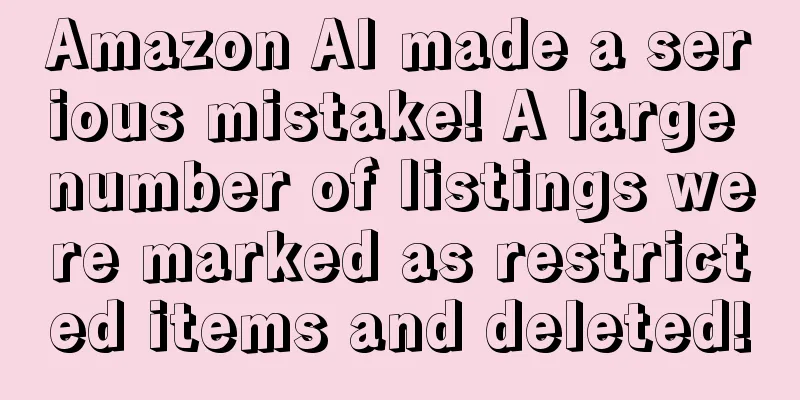Amazon AI made a serious mistake! A large number of listings were marked as restricted items and deleted!

|
Amazon’s AI has become increasingly “ intelligent ” recently. However, the major AI crash that occurred a while ago, in which a large number of listings were mistakenly deleted, was indeed a bit too much. 1 Amazon's AI feature goes horribly wrongRecently, some sellers reported that Amazon's AI system mistakenly identified some normally used words as banned words during the review process, resulting in tens of thousands of product listings being deleted without the sellers' knowledge. For example, a seller who sells carpets used the term "Persian carpet" when describing the product. This was a description of the style of the carpet, but the AI system misunderstood it as an indication of the product's origin. The AI system even determined that the product violated the restricted product policy and required the seller to provide a valid certificate of origin or compliance. Even though the seller had appealed, he had no choice but to delete the product because he did not receive a timely response from Amazon and could not get a certificate of origin. Many sellers said that due to this misjudgment, tens of thousands of listings were deleted, and the economic losses were difficult to estimate. Although Amazon has deleted listings due to violations in the past, the large number of misjudgments this time has left many sellers confused and dissatisfied. To make matters worse, sellers complained that Amazon was slow to handle such issues, with some sellers saying it took them 12-14 days to resolve the issue, a speed they considered "ridiculous." After investigation and analysis by the sellers, the banned words marked by Amazon AI in this incident include but are not limited to: Turkish, Persian/Persia, Aydin, Bohemian, Adja, Asher, Moroccan, and Izil. It can be seen that most of these words are place names. Based on this, some sellers speculate that the above banned words may be related to the trade control laws of the Amazon platform. For sellers who have been affected, they need to first find the offending ASIN and check whether there are any sensitive words in the copy, pictures and videos in the listing. If sensitive words are found, they should be deleted immediately and then try to appeal. When filing an appeal, you must clearly state what type of product you are offering and attach relevant evidence, such as a six-sided image of the product and packaging, a five-point description, a product manual, etc., to prove that the product does not fall into a restricted category. The autumn promotion is approaching. At this critical moment, Amazon AI machine scanning may be more frequent. Sellers should avoid using any restricted keywords that may violate the rules to avoid affecting their stores. At the same time, we also hope that Amazon's A system can be more accurate and reduce the occurrence of misjudgment incidents. 2 AI needs further development and improvementIn fact, this is not the first time that Amazon's AI function has made a mistake. As early as the end of last year, Amazon's AI review summary function was criticized by sellers for inaccurate descriptions or over-emphasizing negative reviews. For example, a seller of tennis sets said that only seven of the more than 4,300 reviews for his product mentioned the odor problem, but Amazon AI exaggerated this negative information in its summary. Although the combination of AI and e-commerce is developing rapidly, this model is still in its infancy and mistakes are inevitable. However, it is undeniable that artificial intelligence has indeed brought huge business opportunities to e-commerce platforms. According to the "Retail AI Readiness Index" report released by IHL Group, by 2029, artificial intelligence is expected to bring more than $1.5 trillion in growth to the North American retail industry. Amazon and Walmart will benefit the most, with both expected to gain $580 billion in growth through AI e-commerce. Although the potential of AI e-commerce is being continuously demonstrated and many remarkable achievements have been made, it still needs to be further developed and improved as a whole. While major platforms and sellers are using AI technology to empower their businesses, they should not rely too much on it and should pay more attention to the quality of products and services and strive to provide consumers with a high-quality shopping experience. |
<<: Sellers should pay attention! These are the new traffic entrances on Amazon mobile terminal!
>>: Amazon begins to implement new FBA policies! Sellers' costs will be reduced!
Recommend
What is export subsidy? Export subsidy assessment
Export bounty types Export subsidies, also known a...
What should I do if the product cannot be found by keyword search?
The product suddenly could not be searched using t...
3,000 accounts were banned in 2 days! As Amazon cracks down on the price hike of masks, here is the secret of shipping 200,000 masks a day...
The global epidemic continues to heat up. Followin...
What is AmaSuite? AmaSuite Review
AmaSuite is a tool that helps sellers discover pro...
Nine minefields of Amazon operations
When optimizing your product, you must consider th...
Americans have spent $72.2 billion online this month! Thanksgiving spending will break records!
It is learned that according to the Adobe Digital ...
The listing was removed from the shelves for no reason, and my brother-in-law started taking action again!
Trump's black humor makes people speechless. T...
What is Youlida Logistics. Overseas Warehouse? Youlida Logistics. Overseas Warehouse Review
Youlida Company (Shenzhen Youlida Technology Co., ...
"Mexico E-commerce Report 2022": Consumer Behavior and Popular Categories Research
It is learned that according to the "2023 Onl...
Breaking news! Yiwu Logistics Park exploded and caught fire, and 900,000 people were exposed for fake orders!
According to the Shenzhen Health Commission, 24 cr...
What is Lanhan Interactive? Lanhan Interactive Review
Bluevision Interactive focuses on one-stop integra...
What is YimiDida? YimiDida Review
Yimi Dida is a supply chain management company tha...
Amazon may hold two Prime Day events this year, increasing the chances of sellers experiencing explosive sales
Amazon is so changeable. It’s already halfway thro...
Amazon's work status at the end of the year
Amazon's work status at the end of the year A...









